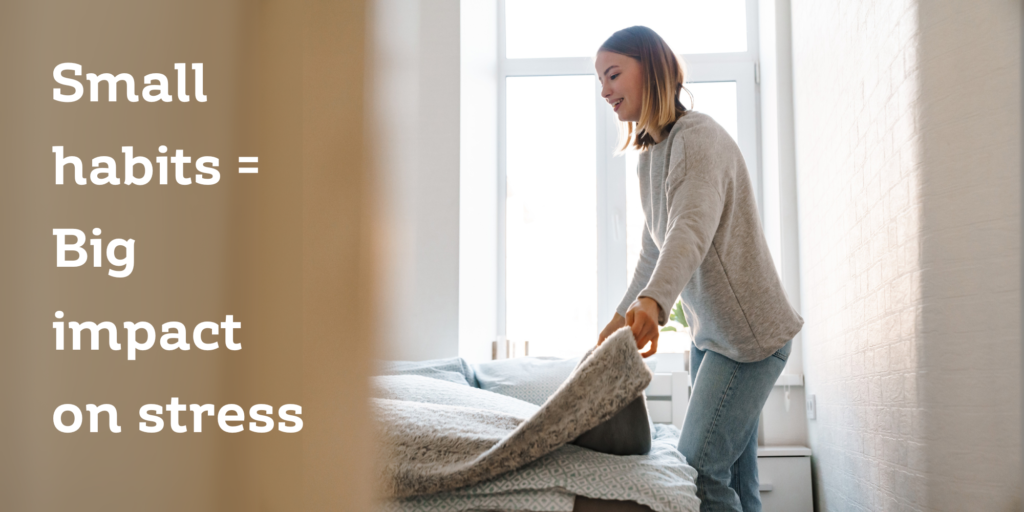Helping Your Teen Manage Anxiety—5 Science-Backed Strategies
Watching your teen struggle with anxiety can be heartbreaking. As a parent, you want to help, but sometimes it feels like nothing you say or do makes a difference. Anxiety can make the world feel overwhelming for teens, leaving them feeling stuck in cycles of worry and stress.
The good news? Science offers powerful, practical ways to help.
Research from leading psychologists and neuroscientists has uncovered simple yet effective strategies that can reduce anxiety, increase resilience, and give teens the tools they need to manage stress. And the best part? These strategies are easy to integrate into everyday life—whether it’s discovering awe in nature, anchoring identity to a deeper “why,” or using deep breathing to calm the nervous system.
In this article, you’ll learn five expert-backed techniques you can use to help your teen reduce anxiety and regain a sense of control—so they can feel calmer, more confident, and better equipped to handle life’s challenges. After reading this post you can take immediate action in making your teen calmer, healthier and stronger.
1. Discovering Awe: The Science of Shrinking Anxiety
Backed by: Dacher Keltner (Psychologist, UC Berkeley, author of Awe)
Why It Works:
When we’re anxious, we focus inward—our worries take up all our mental space. But experiencing awe pulls us out of our own heads and connects us to something much larger. Whether it’s standing at the edge of the ocean, watching a breathtaking sunset, or listening to an incredible piece of music, awe shrinks anxiety by shifting our attention away from our fears. It reminds us that there’s a bigger world beyond our stress and that problems, no matter how big they seem, are just temporary.
How to Try It:
Encourage your teen to seek awe in everyday life by exploring:
- Nature: A walk in the woods, a visit to the beach, or even cloud-watching in the backyard.
- Music & Art: Attending a live concert, visiting a museum, or watching a powerful dance performance.
- Science & Space: Looking through a telescope, visiting a planetarium, or watching videos of the vast universe.
- Moral beauty: Acts of virtue and courage, kindness and compassion in other people.
- Collective effervescence: Being in community with one another – shared experiences like attending a concert, supporting your team at a game or participating in a debate. These shared experiences can lead to a sense of connection and being part of something larger than oneself, which can be incredibly uplifting and can provide a different perspective during stressful times. It can force the teen to take a step outside of their individual concerns and feel united with others.
Make It Fun:
There are thousands of simple ways to create and share an awe moment with your teen. From listening to a piece of classical musical for the first time together or just stargazing at night. If your teen regular gets stuck with their own woes try encouraging them to do some volunteer work at a shelter or retirement home. This will definitely give them perspective on life.
Backed by Science:
Studies show awe reduces stress, increases feelings of connection, and even improves overall well-being (Keltner, 2023).
2. Anchoring Identity: The “Why” Behind Their Actions
Backed by: Jay Shetty & Myra Shankar
Why It Works:
Anxiety often arises during times of uncertainty—whether it’s a big test, changing schools, or figuring out the future. When teens define themselves by what they do rather than why they do it, unexpected changes can shake their entire sense of self.
For example, if a teen sees themselves only as “the star football player,” an injury could make them feel completely lost. But if they connect with why they love football—perhaps it’s about teamwork, discipline, or the thrill of competition—then even if they can’t play, they can still find other ways to fulfill that deeper purpose, like coaching younger players or joining a leadership club. By anchoring their identity to their values rather than external achievements, they gain a sense of stability that lasts through life’s ups and downs. This will make them more resilient to the challenges and changes that will inevitably come their way.
How to Try It:
Ask them:
- “Why does this matter to you?”
- “What’s something you’ve worked hard for, and why did it feel important?”
- “If you weren’t worried about what others think, what would you truly want?”
For example, if they’re stressed about a big exam, help them shift focus:
Instead of: “I have to get a good grade.”
Try reframing: “I love learning new things, and this is a chance to grow.”
Make It Fun:
Try a “Why Chain”—have them write a goal, then keep asking “Why does this matter?” until they reach a deep personal connection.
Example:
“I want to do well in school.”
- “Because I love solving problems.”
- “Because I want to make a difference one day!”
Backed by Science:
Research shows that connecting to personal values reduces stress, increases resilience, and helps people stay motivated (Shankar, 2023).
3. Exercise: The Ultimate Anxiety Buster 🏃♂️
Backed by: Stanford University & Mayo Clinic
Why It Works:
Stress floods the body with cortisol and adrenaline—hormones that keep anxiety high. Exercise burns off these stress hormones, releases endorphins (natural mood boosters), and helps regulate emotions. Movement is one of the fastest ways to break the anxiety cycle and bring the nervous system back to a state of balance.
How to Try It:
- Short bursts of movement – A 5-minute dance-off, jumping jacks, or a walk around the block can quickly lower stress.
- Outdoor activities – Being in nature boosts mood even more than indoor exercise. Try hiking, cycling, or even gardening.
- Team & Social sports – Playing basketball, soccer, or even just tossing a ball back and forth creates a sense of connection that also helps ease anxiety.
- Yoga & stretching – Slower, mindful movement calms the nervous system and helps reduce muscle tension caused by anxiety.
Make It Fun:
Turn it into a parent-teen challenge: “Let’s both try a new activity this week and see how it makes us feel!”
Backed by Science:
Research shows regular exercise reduces anxiety by up to 40% and improves overall emotional resilience (Mayo Clinic, 2022).
4. Deep Breathing and Relaxation Techniques: Calming the Nervous System
Anxiety can make your teen’s body feel like it’s stuck in fight-or-flight mode—heart racing, shallow breathing, tense muscles. One of the fastest ways to counteract this stress response is through deep breathing and relaxation techniques.
Why it Works:
When we slow our breathing, we send signals to the brain that we are safe. This activates the parasympathetic nervous system, which lowers heart rate, reduces stress hormones, and promotes a sense of calm.
How to Try It:
Box Breathing (4-4-4-4 Method) – Inhale for 4 seconds, hold for 4 seconds, exhale for 4 seconds, hold for 4 seconds, and repeat. This technique is used by Navy SEALs to stay calm under pressure!
5-Second Inhale, 7-Second Exhale – Encourage your teen to exhale longer than they inhale to naturally slow their heart rate and relax the body.
Progressive Muscle Relaxation – Guide your teen to tense and relax different muscle groups in their body, from their toes to their shoulders. This helps release stored tension.
Calming Visualization – Ask your teen to close their eyes and picture a peaceful place, like a beach or a forest. This mental shift can lower stress in minutes.
Make it Fun:
Try a “breathing buddy” exercise with younger teens—have them lie on their back with a small stuffed animal on their belly. As they breathe in and out, they can watch the toy rise and fall, helping them focus on deep, slow breathing.
Backed by Science: Studies show that controlled breathing can reduce anxiety, improve focus, and even lower blood pressure (Zaccaro et al., 2018). Teaching teens these techniques gives them a powerful, lifelong tool for managing stress.
5. The Power of Routine and Small Wins: Creating Stability in Uncertain Times
When anxiety takes over, life can feel overwhelming. One of the best ways to help your teen regain a sense of control is by focusing on small, manageable actions—and sticking to a simple routine.
Why it Works:
Anxious minds often spiral into worst-case scenarios. Routines provide structure, and small wins create a sense of progress—helping your teen shift from “everything is too much” to “I can do this.” Research shows that predictability reduces stress, as the brain doesn’t have to constantly make decisions about what comes next (Galla & Duckworth, 2015).
How to Try:
Morning & Night Rituals – Encourage small, calming habits like stretching in the morning, journaling, or drinking tea before bed. These moments of routine signal safety to the brain.
One Small Win Per Day – Have your teen set one achievable goal each day—even something as simple as making their bed or replying to a message they’ve been avoiding. Small wins build momentum!
The “2-Minute Rule” – If a task feels overwhelming, start with just two minutes of effort (e.g., “I’ll study for two minutes” or “I’ll write one sentence”). Often, just starting breaks through the anxiety barrier.
Visual Progress – A simple checklist or habit tracker can help your teen see their accomplishments and boost confidence.
Make it Fun:
Turn routines into a challenge—who can keep their streak going the longest? Parents can join in too!
Backed by Science: Studies show that routines help regulate mood, reduce stress, and improve mental well-being (Hagger, 2019). Helping your teen establish small daily rituals gives them a foundation for long-term resilience.
Conclusion: Take the First Step Toward Helping Your Teen (and Yourself!)
Anxiety doesn’t have to define your teen’s life. With the right tools, they can learn to shift their mindset, regulate their emotions, and build resilience—and you can be their greatest source of support along the way.
By encouraging small, science-backed changes—whether it’s introducing awe, helping them connect with their deeper “why,” or simply establishing a comforting routine—you’re giving your teen the skills they need to manage stress not just today, but for life.
Oh and by the way—these strategies aren’t just for teens! We all experience stress and anxiety at times. Whether you’re navigating work pressures, parenting challenges, or everyday worries, these same techniques can help you, too. You can lead by example by tackling your own stress—or maybe your partner needs these tools even more!
Now I’d love to hear from you! Which of these strategies do you think would help your teen (or even yourself) the most? Let me know in the comments.Also, I’m considering creating a free downloadable eBook with even more expert-driven strategies for parents of anxious teens. Would this be helpful to you? Drop a comment below and let me know!







